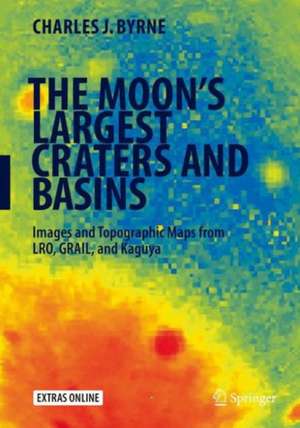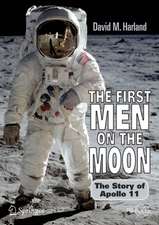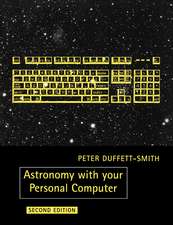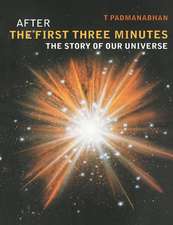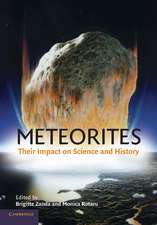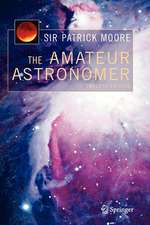The Moon's Largest Craters and Basins: Images and Topographic Maps from LRO, GRAIL, and Kaguya
Autor Charles J. Byrneen Limba Engleză Hardback – 2 dec 2015
Toate formatele și edițiile
| Toate formatele și edițiile | Preț | Express |
|---|---|---|
| Paperback (1) | 278.91 lei 38-45 zile | |
| Springer International Publishing – 29 oct 2016 | 278.91 lei 38-45 zile | |
| Hardback (1) | 338.26 lei 3-5 săpt. | |
| Springer International Publishing – 2 dec 2015 | 338.26 lei 3-5 săpt. |
Preț: 338.26 lei
Nou
Puncte Express: 507
Preț estimativ în valută:
64.73€ • 67.45$ • 53.59£
64.73€ • 67.45$ • 53.59£
Carte disponibilă
Livrare economică 14-28 martie
Preluare comenzi: 021 569.72.76
Specificații
ISBN-13: 9783319220314
ISBN-10: 3319220314
Pagini: 225
Ilustrații: IX, 246 p. 179 illus., 156 illus. in color.
Dimensiuni: 178 x 254 x 17 mm
Greutate: 0.81 kg
Ediția:1st ed. 2016
Editura: Springer International Publishing
Colecția Springer
Locul publicării:Cham, Switzerland
ISBN-10: 3319220314
Pagini: 225
Ilustrații: IX, 246 p. 179 illus., 156 illus. in color.
Dimensiuni: 178 x 254 x 17 mm
Greutate: 0.81 kg
Ediția:1st ed. 2016
Editura: Springer International Publishing
Colecția Springer
Locul publicării:Cham, Switzerland
Public țintă
Popular/generalCuprins
Introduction.- Refining the sequence of features.- Feature Diameter as a Function of Sequence Number.- Initial Depth and Later Isostatic Compensation.- Bouguer Gravity Patterns of Impact Features.- PreNectarian Period.- Nectarian Period.- Early Imbrium Period.- Late Imbrian Period.
Notă biografică
Most of Charles J. Byrne's career after receiving a BSEE from RPI and MSEE from Caltech has been spent at Bell Laboratories as a researcher in communications and a manager of the development of operations systems for communication networks.
During the Apollo project, he moved to Bellcom, an ATT subsidiary that served as the system engineering arm for the Apollo project managers at NASA Headquarters, where he was responsible for planning for the selection and certification of landing sites for Apollo. This entailed setting requirements and planning operations for the Lunar Obiter missions. This generated an interest in the features of the Moon that led to authoring two Springer books; “Lunar Orbiter Photographic Atlas of the Near Side of the Moon” (2005) and “The Far Side of the Moon, a Photographic Guide” (2008). Charles J. Byrne also authored the Springer Brief, “The Moon’s Near Side Megabasin and Far Side Bulge” (2013), partly based on a peer-reviewed paper in Earth, Moon, and Planets (2007).
During the Apollo project, he moved to Bellcom, an ATT subsidiary that served as the system engineering arm for the Apollo project managers at NASA Headquarters, where he was responsible for planning for the selection and certification of landing sites for Apollo. This entailed setting requirements and planning operations for the Lunar Obiter missions. This generated an interest in the features of the Moon that led to authoring two Springer books; “Lunar Orbiter Photographic Atlas of the Near Side of the Moon” (2005) and “The Far Side of the Moon, a Photographic Guide” (2008). Charles J. Byrne also authored the Springer Brief, “The Moon’s Near Side Megabasin and Far Side Bulge” (2013), partly based on a peer-reviewed paper in Earth, Moon, and Planets (2007).
Textul de pe ultima copertă
This most recent book from lunar expert Charles J. Byrne combines the latest comprehensive imagery, topography and gravity data from all three recent Moon missions, Kaguya, Lunar Reconnaissance Orbiter and GRAIL. These major polar-orbit surveys are presented here in compact form for the convenience of amateur and practical astronomers concerned with the Moon. Chosen from the Near and Far Side's large craters and basins over 200 km in diameter, each of the 71 highlighted features is depicted with a two-page presentation of the data that includes false color topographic maps next to the mission images. Additionally, the features are presented in the estimated chronological sequence of their creation, based on a consideration of stratigraphy (overlapping layers from neighboring features) and the relative degradation of surface features. Using this sequence as a way to convey the relative ages of lunar features, the author presents various theories concerning the Moon’s impact and thermal history e.g. the available evidence allows for constraints to be placed on the duration of the Late Heavy Bombardment period. The relationships between impact dynamics and variations in the gravity field of the Moon are also discussed. The new mission data makes possible this renewed conjecture about the history and evolution of the Moon, which is presented here with much worthwhile information for amateurs and professionals alike.
Caracteristici
Features a false-color map of the topography of each crater and basin image, as well as gravity maps for every feature Includes imagery from the latest spacecraft such as the Lunar Reconnaissance Orbiter (LRO) and GRAIL missions Combines data from several sources on each of the large features covered, making this a useful research reference
